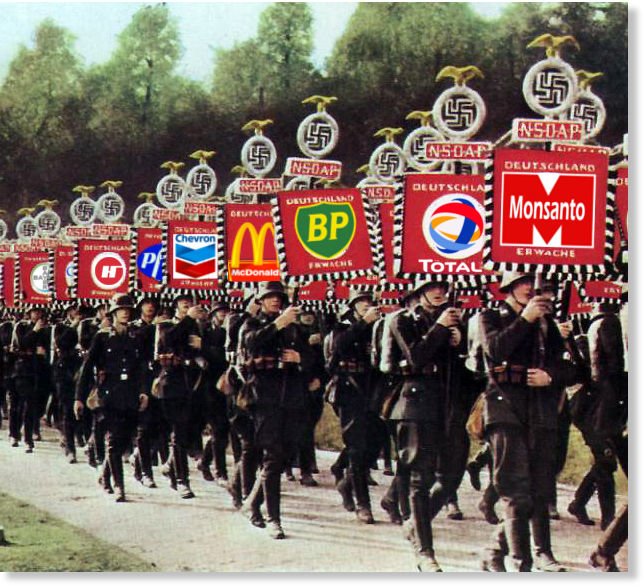
If I used the term “corporatism” as a criticism of America, you’d probably think I’m against “corporate greed,” like Obama, or against anything profit-motivated in the private sector.
Actually, corporatism is defined as a “socio-political organization of a society by major interest groups, or corporate groups, such as agricultural, business, ethnic, labor, military, patronage, or scientific affiliations, on the basis of [perceived or claimed] common interests.”
Corporatism is, in fact, what we have in the United States today. But it’s not capitalism.
Capitalism refers to a social system in which all property—aside from what’s needed for police, courts and a military—is privately owned. Capitalism upholds the rights of the individual to be free from force. It does not redistribute wealth, it does not provide homes, education, automobiles, cell phones, food stamps, unemployment insurance or anything else. It does not impose unfunded mandates (payroll taxes, Medicare, Obamacare) on the private sector and then selectively lift those mandates on politically favored companies.
Capitalism, unlike corporatism, simply protects rights.
Corporatism is what develops the moment you depart from capitalism. Once the government departs from its mission of protecting individual and property rights, and begins to transfer wealth from one party to another, the interest group warfare of corporatism becomes inevitable.
Why? Because people have to defend their rights. And others wish to play the special interest game, in order to attain benefits they could not gain in the absence of coercion.
Example? If the government is going to take ten percent of my property, but none of your property, it’s reasonable for me to form a special interest group (corporate or otherwise) in an attempt to make sure that either (1) government stops taking my property or, (2) government starts taking 10 percent of your property, as well.
Of course, the only rational and proper course would be for the government to stop taking anyone’s property, period, and to stop violating the property rights of some, all, or even one person.
That’s not what happens. Psychologically, once something starts to go on long enough, in most people’s minds it’s no longer wrong. It’s simply the way that it is.
After many generations of corporatism following the initial founding of our republic, that’s the state of ignorance and evasion in which America is today. Obama is merely its culmination (or collapse).
If you start questioning government seizure of wealth and property on principle, you’re labeled extreme, irrational or (most dreaded of all) “ideological” (i.e. having ideas and a willingness to state, prove and/or defend them.)
In other words, if you challenge the status quo when there are logical fallacies or inconsistencies in what takes place, people who wish the status quo to stay the way that it is (for whatever reasons) will seek to intimidate you.
Most people are aware of the corporate interest groups that exist in our society. Most see this as an inevitable function of capitalism. But capitalism neither permits nor requires the existence of corporate interest groups. Under capitalism, nobody is allowed to steal property from another, and no business is allowed to have one set of rules apply to itself while a different set applies to another. Everyone is equal under capitalism—not in ability or level of success, but in their status under the law.
If you don’t favor capitalism, then fine. But don’t point to what we have today in the United States (or anywhere) and call it capitalism.
Politicians (and Obama is only the latest, and the most vulgar to date) count on this ignorance about the distinction between corporatism and genuine capitalism when they say and do the things they say and do.
They talk of unfairness and greed, hoping you’ll ignore the fact that under a system of genuine private property and free enterprise, the only things that can prevail, over the long run, are excellence, quality and integrity. That’s why under capitalism the standard of living continuously rises, while under any form of government control (including corporatism) things stagnate or decline. In America, things are presently stagnating. Decline will eventually come, unless we completely reverse course and restore (permanently) a system of capitalism, i.e. exclusively private ownership of the means of production.
In a system such as capitalism, where no business can gain special favors, exemptions or subsidies from the government—not ever—then there’s nothing to cause any business to succeed or fail other than pleasing (or failing to please) customers with the product or service they offer.
The only kinds of businesses who benefit from interest group corporatism are the ones who would never thrive or survive in an unhampered marketplace—or at least (due to insecurity) feel they would not.
In the end, nobody “benefits” under corporatism (or socialism) because stagnation and decline ultimately bring everyone down—including those who got the perks from the government, while there were still perks to be had.
Be sure to “friend” Dr. Hurd on Facebook. Search under “Michael Hurd” (Rehoboth Beach DE). Get up-to-the-minute postings, recommended articles and links, and engage in back-and-forth discussion with Dr. Hurd on topics of interest.
